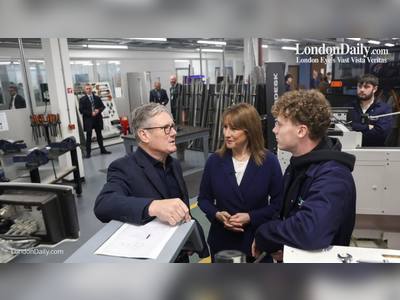UK Chooses Wylfa for First Small Modular Reactors, Drawing Sharp U.S. Objection
Britain backs domestic SMR rollout in North Wales while Washington criticises rejection of a large U.S.-led project
Britain has confirmed that Wylfa on the island of Anglesey in North Wales will host the country’s first small modular nuclear reactors, marking a decisive shift toward domestically built technology aimed at strengthening long-term energy security.
The government selected the site as the flagship location for its small modular reactor programme, entrusting the project to Rolls-Royce with the goal of delivering new nuclear capacity at lower cost and on a faster timeline than traditional large-scale plants.
The decision has prompted frustration from the United States, which had been advocating for a major U.S.-led reactor project at the same site.
U.S. Ambassador Warren Stephens issued an unusually sharp statement expressing disappointment, arguing that alternative American designs could have delivered cleaner and more affordable energy more quickly.
Washington had sought deeper involvement in Britain’s civil nuclear sector, viewing Wylfa as a key strategic foothold.
British officials defended the choice as a matter of sovereign capability, insisting that Wylfa is the most suitable location for modular reactors and underlining the government’s commitment to a domestic nuclear manufacturing base.
A spokesperson for Prime Minister Keir Starmer said the UK remained eager to work with U.S. partners on future projects and signalled that a separate large-scale reactor could still be built at another site to maintain cooperation with Washington.
The Wylfa plan is expected to support up to three thousand jobs during construction and generate enough electricity to power around three million homes once operational in the 2030s.
It forms part of Britain’s broader nuclear expansion strategy, which includes major plants already under construction at Hinkley Point C and Sizewell C.
The diplomatic tension adds a political layer to Britain’s energy transformation.
The government argues that modular reactors offer a faster and more flexible pathway to strengthening national energy resilience while rebuilding industrial capacity.
The United States, however, contends that Britain’s approach risks delaying the reductions in energy costs needed to underpin manufacturing and economic growth.
Despite the disagreement, both governments continue to emphasise cooperation in defence and energy, with future nuclear siting decisions expected to play a decisive role in shaping the next phase of U.K.–U.S. strategic alignment.
The government selected the site as the flagship location for its small modular reactor programme, entrusting the project to Rolls-Royce with the goal of delivering new nuclear capacity at lower cost and on a faster timeline than traditional large-scale plants.
The decision has prompted frustration from the United States, which had been advocating for a major U.S.-led reactor project at the same site.
U.S. Ambassador Warren Stephens issued an unusually sharp statement expressing disappointment, arguing that alternative American designs could have delivered cleaner and more affordable energy more quickly.
Washington had sought deeper involvement in Britain’s civil nuclear sector, viewing Wylfa as a key strategic foothold.
British officials defended the choice as a matter of sovereign capability, insisting that Wylfa is the most suitable location for modular reactors and underlining the government’s commitment to a domestic nuclear manufacturing base.
A spokesperson for Prime Minister Keir Starmer said the UK remained eager to work with U.S. partners on future projects and signalled that a separate large-scale reactor could still be built at another site to maintain cooperation with Washington.
The Wylfa plan is expected to support up to three thousand jobs during construction and generate enough electricity to power around three million homes once operational in the 2030s.
It forms part of Britain’s broader nuclear expansion strategy, which includes major plants already under construction at Hinkley Point C and Sizewell C.
The diplomatic tension adds a political layer to Britain’s energy transformation.
The government argues that modular reactors offer a faster and more flexible pathway to strengthening national energy resilience while rebuilding industrial capacity.
The United States, however, contends that Britain’s approach risks delaying the reductions in energy costs needed to underpin manufacturing and economic growth.
Despite the disagreement, both governments continue to emphasise cooperation in defence and energy, with future nuclear siting decisions expected to play a decisive role in shaping the next phase of U.K.–U.S. strategic alignment.









